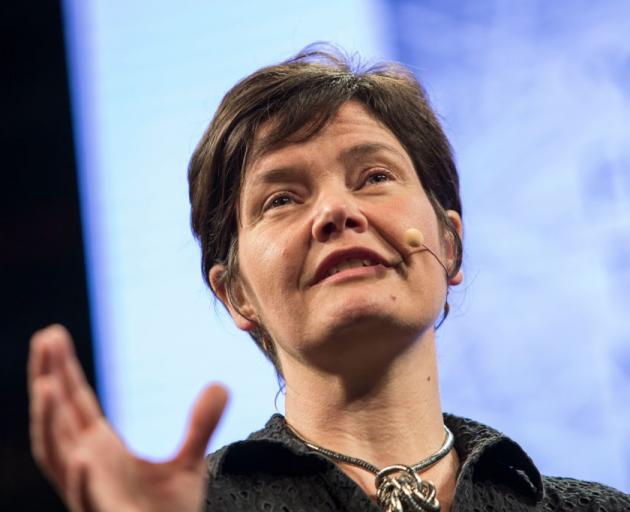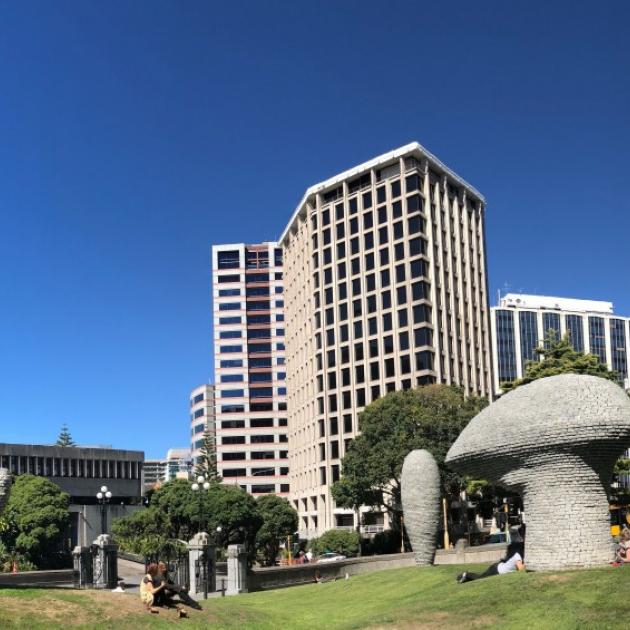
Pop quiz: what's the biggest sector of the New Zealand economy?
If you guessed dairy or tourism, you are probably in pretty good company.
But you'd be wrong.
The biggest sector of the New Zealand economy is in all likelihood the household sector. And before you rush off to check the national accounts, don't bother. You won't find the figures there. The household sector, and all the unpaid work that goes on there - having and raising children, teaching, nurturing, caring and the rest - performed mainly by women, is never counted, has never counted.
This is not a revelation, rather it's a reminder, delivered by Prof Marilyn Waring, who first laid out this baffling omission decades ago.

Typically, Prof Waring's book, Still Counting: Wellbeing, Women's Work and Policy Making, speaks plainly.
"Our planet is going to hell,'' she writes. "But it's all OK, because it helps the growth figures.''
It is a barrage from the former MP and long-time academic aimed squarely at that most familiar measure of economic progress, gross domestic product (GDP).
According to GDP, dairying and tourism are indeed our most important sectors. But the shine is coming off GDP as the best indicator of a brighter future.
"GDP's focus on production, the unending pursuit of growth rates, is inexhaustibly destructive of living environments. The Great Barrier Reef, for example, has been traded off against climate change-inducing economic activities, pollution run-off from mining and agriculture, fishing practices and coastal development,'' Prof Waring says in the book.
As well as ignoring the unpaid workforce - in or outside the home - GDP also counts any and all "productive'' activity, regardless of its negative impacts; activities that deforest, despoil and warm the planet are in, alongside porn, gambling and war.
Once, Prof Waring was a rare voice raised in objection, back when she wrote her groundbreaking book Counting for Nothing, in 1984, pointing out that if unpaid work and the environment are not measured and valued, then they will be overlooked when governments make laws and set policies.

There are many more voices singing from a similar song sheet these days. University of Oxford economist Kate Raworth, author of the influential Doughnut Economics: Seven Ways to Think Like a 21st-Century Economist, talks about the values that sit behind GDP as a cuckoo in the nest.
Hoodwinked into believing GDP is simply an objective measure of how we are doing, we do all we can to support it, Raworth says, only to hatch a whole brood of unintended consequences: pollution and inequality among them.
An example from Prof Waring's book illustrates the problem.
Economist Julie Smith has been working on valuing breast milk and having it included in Australian GDP figures. Her estimate is that it has an annual value of $A2.1 billion ($NZ2.2 billion). But as it is not included in that country's GDP, policy makers are unlikely to support it the way they should.
On the phone from Auckland, where she is professor of public policy at Auckland University of Technology, Prof Waring has just caught a bus into town and has to find a quiet spot to talk. Having done so, she takes up the case.
"Lactation is a major - I hate to use the economic terms - but it is a major preventative investment in health and education outcomes later for the child,'' she says.
So it is precisely what you want women to be doing for the first six months of their children's lives. But if we are not measuring it, we undervalue its importance.
Prof Waring says if we did have the figures for New Zealand, policy might well follow.
"I think every one of those women, the Government should be paying into their KiwiSaver account.
"They are doing a huge thing for the nation, huge. We already know that having a child, and even with maternity leave, has ramifications on the amount of money women can save on their income vis a vis men.''
And that's just lactation. Reproduction is similarly missing from the GDP picture.
"Reproduction is not in any framework yet. At all. Nothing,'' she says. "No lactation, and no having children and no caring for them. It is magic. At 15 all of a sudden we all appear as human capital and the only investments are what government paid for.''
The UK's chief statistician recently demonstrated that in the UK the unpaid economy was the size of all retail and manufacturing combined, Prof Waring says. He was asked why he did the calculation and said he needed a picture of the whole economy.

And then there's the environment.
"I mean, we don't need any other warning except global warming to say to people, 'Look, for Christ's sake, look what GDP has helped do here'.''
The professor wants us all to think again about these sorts of things now because of a renewed emphasis on "wellbeing'' by the country's coalition Government and some work that is flowing from that.
Finance Minister Grant Robertson has said next year's budget will be a "wellbeing budget''.
"We are moving beyond GDP to not just look at our financial health, but also the health of our environment and strength of our communities,'' he told this year's Labour Party Conference in Dunedin.
Prime Minister Jacinda Ardern has said she wants New Zealand to be the first place where the budget "demonstrates the overall wellbeing of our country and its people''.
Treasury has been working on a Living Standards Framework (LSF) for some years, in an attempt to broaden the basis of its advice to government, and has now updated it to measure "intergenerational wellbeing''.
The Treasury website declares "there is more to wellbeing than just a healthy economy'' and says the LSF will help it "advise governments about how the policy trade-offs they make are likely to affect everyone's living standards''.
The LSF assesses wellbeing according to "four capitals'': human, social, natural and financial/physical.
So, natural capital "refers to all aspects of the natural environment needed to support life and human activity''. Land, soil and water are in there, alongside "energy resources''. Human capital includes "people's skills, knowledge and physical and mental health''.

Its attachment to internationally agreed conventions means the "capitals'' will be monitored against a select few indicators, so many of the important activities and considerations that have been missing all these years from GDP calculations, will still not count.
And anyway, Prof Waring says, the GDP indicator in the LSF mix is "still valuing destruction, deforestation, deterioration in what they would call natural assets. So there is a real internal tension''.
Prof Waring suggests feeding a much broader and more detailed set of inputs into the policy machine. All current and rigorously collected environmental data should be considered, not just a couple of proxies.
For example, she says, lead levels should be there, because of their impact on children's development. If that doesn't make the cut for the LSF, Treasury's advice will still be deficient.
Also close to the top of Prof Waring's prescription for better policy advice is the use of time-use surveys, instead of GDP-type economic transactions, to identify what people are really doing and valuing.
New Zealand has actually done time-use surveys before. The first, in 1998, was the most sophisticated undertaken anywhere at that time, Prof Waring says. Thousands of people filled out a diary for 48 hours, recording their activity in five-minute intervals.
It found that time spent on unpaid work as a primary activity equated to 2 million full-time jobs, compared with the 1.7 million in the paid labour force at the time.
Interestingly, it also identified that Maori do the most voluntary work outside the household.
One more time-use survey was conducted in 2008-9, but that was it.
Time-use surveys simply give us a fuller picture, the professor says.
"So the single largest economic sector, which doesn't count, now gets counted in terms of time use. And it is clearly visible as the sector that underpins everything else.''
Time-use has the added advantage that it will be just as useful in 40 or 50 years, she says, when the anticipated disruptions of the coming decades make GDP even more difficult to assess.
"So time-use is really significant: who's doing what, when; how do you support that work? I don't mean pay it, support it.''
And the surveys can be designed by us, for us. That is not the case with GDP, which is calculated according to the United Nations System of National Accounts; a one-size-fits-all rule book that sets a "boundary of production'', ruling some stuff in and some stuff out.
Prof Waring stopped adding new material to her book in July this year, because at that time she joined the Treasury's "challenge group'' on the Living Standards Framework.
Her experience since then has given her hope.

"They are eager to think in other ways, I have definitely seen that demonstrated.
"And I am sure that the Government would be eager to move outside the old framework.''
The professor was at a discussion that also involved Grant Robertson and Assoc Finance Minister James Shaw.
"I can't say what was said ... I think there is a space between where Treasury have got to and where parliamentarians want them to get to.''
She says she is trying to both contribute to the process herself and flag to others that now is the time to speak up.
"So that we take this opportunity - because we might be stuck with [GDP] for another 60 years - to put in place a framework that has to have what I call open architecture.''
That "open architecture'' would not just mean that policy makers have access to good information as it becomes available, but it would allow more people to stay engaged with decision-making processes.
"I think whatever follows GDP, one of the key features must be that it democratises the debate, that it makes the debate accessible, so you don't have to have a doctorate in economics to contribute.''
Prof Waring knows what she is proposing will be a stretch for many. But she's equally sure New Zealand can pull it off.
"We can do it. We've been first for quite a few things. We do this, we're smart.
And we need to do it, she says.
"The big things aren't changing; we are not preserving and enhancing our environment for future generations, you know? We are still just ignoring the unpaid work that makes possible everything else that everybody does. These are huge and it's time we moved on.''
Comments
GDP is based on money numbers. Sure, it doesn’t cover every aspect of work done in society but it does represent what people are willing to pay money for.
Including unpaid work will make the measure totally useless because we all know what drives the unpaid work figures is ideological driven, therefore open to politics.













